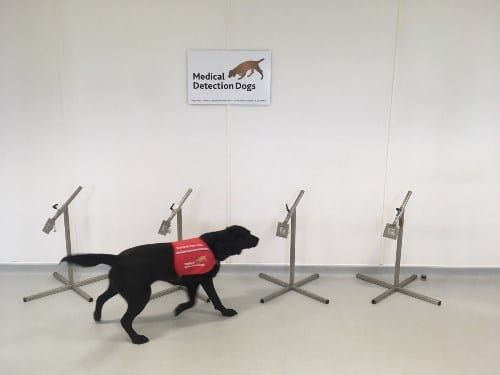The dogs that work to detect cancer
By Jack Ashby, on 22 November 2017
The Grant Museum’s current exhibition – The Museum of Ordinary Animals: The Boring Beasts that Changed the World - explores the mundane creatures in our everyday lives. Here on the blog, we will be delving into some of the stories featured in the exhibition with the UCL researchers who helped put it together.
Guest post by Katrina Holland (UCL Anthropology)
It’s 8.45am at a business park in rural Buckinghamshire, UK: my primary field site. A car pulls up and Kiwi jumps out, rushing into the workplace where she spends 3 days each week. Striding into the office, Kiwi wags her tail and greets her colleagues by pressing her wet nose into each of their trousers. Shortly after arriving, Kiwi is escorted by her trainer Sam to a grassy paddock where the pair stretch their legs. For Kiwi, this means darting across the field with her nose to the ground and choosing places to do her “business”. Meanwhile, armed with poop bags, Sam walks several laps of the paddock keeping a watchful eye on Kiwi. On their return to the office, Kiwi curls up on a cushion underneath Sam’s desk and dozes for an hour, before Sam calls her into the training room next door. Here Kiwi works, sniffing urine samples for up to 45 minutes per day as she learns to detect the odour of prostate cancer in urine.
 Close
Close



